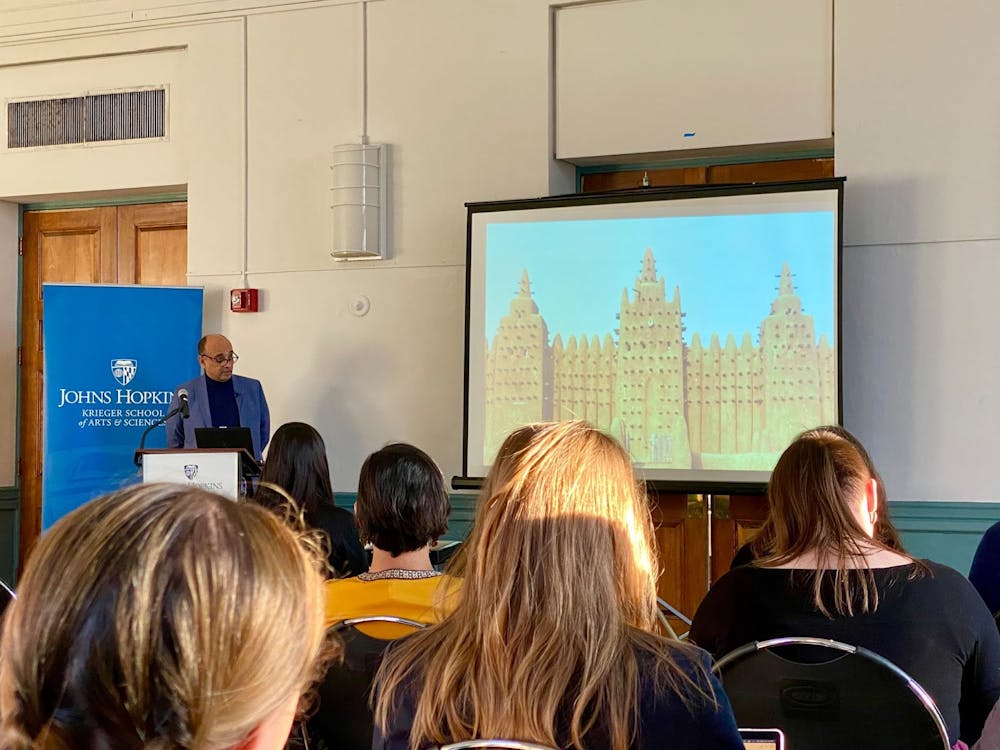The Alexander Grass Humanities Institute (AGHI) hosted the 2023 Richard A. Macksey Lecture featuring Kwame Anthony Appiah, a professor of Philosophy and Law at New York University, on March 9. His talk was titled “Who’s Heritage? Preservation, Possession, and Peoples.” This annual lecture honors the late Professor Richard A. Macksey, co-founder of the Humanities Center that is now the Department of Comparative Thought and Literature.
A focal point for the 13 humanities departments at Hopkins, AGHI invites scholars to present on topics across the humanities and humanistic social sciences, furthering interdisciplinary discussions and spotlighting timely and critical conversations.
In an interview with The News-Letter, William Eggington, the director of AGHI, discussed the significance of having Appiah speak with the Hopkins community.
“[Appiah] is one of the most important philosophers working today, who's written extensively on questions of history and identity, whose heritage, regarding the history of monuments and preservations, is something that is a burning issue front,“ he said. “When Professor Appiah speaks about these things, it's going to be thought-provoking and something to get conversation sparked.”
Appiah, who holds a Bachelor of Arts and doctoral degrees from Cambridge University, has taught in Ghana, France, Britain and the U.S. at various institutions, including Cornell, Harvard and Duke. He has also received the National Humanities Medal from President Barack Obama.
During his lecture, Appiah described the historical implications of collecting artifacts, beginning with the early colonization of African nations, using the West African nation of Benin as an example.
“When it comes to history, the discussion of the Benin bronzes does have many of these historical implications. Many of these marvelous objects were literally made out of payments, or slavery,” he said.
He explained how the collection of artifacts from Western and Northern Africa are largely connected to the desire for colonizers to display their prizes. He drew from Homer’s Iliad, using Achilles’ conflict with Agamemnon to demonstrate this concept.
“The classical literature of Europe [the Iliad] begins with a dispute over war spoils, showing us the rage of Achilles. The Iliad says the fact that Agamemnon took from him a young woman who was captured in battle is what enraged Achilles,” he said. “The disputes at the start of the Iliad aren't about whether you can take goods and people captured in that home. Nobody doubts that.”
Appiah framed heritage and the role of antiquities through a cultural lens, connecting the role of objects to individual identities. However, he also explained how individual identities can lead to the destruction of objects.
He cited the Taliban’s rule over Afghanistan in the late 1990s and early 2000s as an example of this idea.
“The Taliban regime was noisily calling for the destruction of figurative pre-Islamic objects. They blew up parts of the Buddha's curators in Afghanistan's National Museum,“ he said. “Finally, they were moved to Switzerland for temporary storage.”
Later in the lecture, Appiah highlighted the significance of violence in the accumulation of cultural antiquities.
“When we gaze upon these objects and museums and reporters, we should remember the violence that trails what history we want to revisit and what it says about provenance... such museums represent the bounds of the slave — the cultural heritage of other peoples,” he said.
In an interview with The News-Letter, freshman Raghav Agrawal discussed the connections he observed between Appiah’s earlier texts and the lecture.
“It's quite interesting to see how his views have not really changed since he wrote his paper in 2006. He had similar arguments. I was fascinated by the fact that he's really stuck to it,” he said. “I'm not sure that the world has really moved on in his argument about who owns the past. But I know that there are people like him, fighting the good fight.”
Throughout the lecture, Appiah emphasized the need to create and maintain reciprocal relationships between those who took versus those who were taken from.
“Why do we recognize that our culture can be rich? I tell you from elsewhere. We are glad now that others have seen fit to borrow from us,” he said.
Freshman Hannah West attended the lecture after reading Appiah’s texts in her course, Reintroduction to Writing: Who Owns the Past?
In an interview with The News-Letter, West shared her interest in Appiah’s perspective.
“He dove a lot deeper into what he thinks about everyone deserving to see art by other people,” she said. “This is different from what a lot of other people think about: if something is from another place, it should be given back to that place.”





